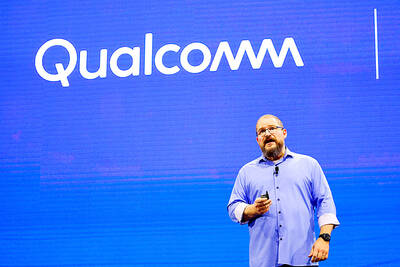VIA Technologies Inc (
Although analysts say the sales increase indicates inventories of computer components in Taiwan may be clearing out, it's too early to say whether the rise in VIA chipset sales mean the PC market is turning around.
The company posted January sales of NT$3.088 billion (US$93 million). The figure was up by 91 percent over the same time last year and 33 percent higher than December sales.
"The AMD [chipset KT1338A] product was the one with the highest demand," said Manuela Mercandelli, spokeswoman for VIA. "We forecast this sales increase will last through February."
Despite a week off for Chinese New Year, VIA beat market expectations of a NT$2.8 billion sales target by a slim margin. The company's shares rose 2.6 percent to NT$280 on the Taiwan Stock Exchange.
News of a PC sales slowdown caused VIA sales to fall from NT$3.8 billion in August last year to NT$2.7 billion in September. The sales fall is surprising because the fourth quarter is usually a time of heavy back to school and Christmas computer sales. VIA sales revenue remained at the NT$2.7 billion level until falling further in December.
"Back in August or September, motherboard makers believed PC sales would not be as good as expected in the fourth quarter, and they cut chipset orders," said Henry King (
King called VIA's sales performance "outstanding" in light of a sluggish PC market. He also said the recent sales pickup is due to increased demand in Europe due to the appreciation of the euro. With the value of the European currency, rising against the dollar, PC prices have fallen across the continent.
Although demand rose for chipsets last month, analysts say it will take a few more months of high demand to convince them the PC market is turning around. Further, the market won't know until after the CEBIT computer trade show in Germany this March. A significant rise in orders to motherboard makers at the show would indicate a significant change in the PC market.
VIA's sales of its chipsets -- a component that links the microprocessor to the computer memory and other parts of the PC -- do point to declining inventories of PC components.
According to Sharon Su, an analyst at ABN-AMRO, component inventories have "been worked out significantly."
In the event of even a small rise in PC demand, sales of motherboards, chipsets and other PC components should rise quickly as well.

Intel Corp yesterday reinforced its determination to strengthen its partnerships with Taiwan’s ecosystem partners including original-electronic-manufacturing (OEM) companies such as Hon Hai Precision Industry Co (鴻海精密) and chipmaker United Microelectronics Corp (UMC, 聯電). “Tonight marks a new beginning. We renew our new partnership with Taiwan ecosystem,” Intel new chief executive officer Tan Lip-bu (陳立武) said at a dinner with representatives from the company’s local partners, celebrating the 40th anniversary of the US chip giant’s presence in Taiwan. Tan took the reins at Intel six weeks ago aiming to reform the chipmaker and revive its past glory. This is the first time Tan

Qualcomm Inc is strengthening its partnerships with Taiwan Semiconductor Manufacturing Co (TSMC, 台積電) and original design manufacturers (ODMs) in Taiwan as it expands its presence in the artificial intelligence (AI) computer market, CEO Cristiano Amon said in Taipei yesterday ahead of the annual Computex trade show. “Historically we’ve always been a very big customer of TSMC, and we continue to be,” Amon said during a media Q&A session. “For chip manufacturing, we’re among the largest fabless [semiconductor designers],” he said, noting that Qualcomm, a leading provider of mobile and AI-enabled chipsets, ships about 40 billion components every year, with TSMC being

‘FAILED EXPORT CONTROLS’: Jensen Huang said that Washington should maximize the speed of AI diffusion, because not doing so would give competitors an advantage Nvidia Corp cofounder and chief executive officer Jensen Huang (黃仁勳) yesterday criticized the US government’s restrictions on exports of artificial intelligence (AI) chips to China, saying that the policy was a failure and would only spur China to accelerate AI development. The export controls gave China the spirit, motivation and government support to accelerate AI development, Huang told reporters at the Computex trade show in Taipei. The competition in China is already intense, given its strong software capabilities, extensive technology ecosystems and work efficiency, he said. “All in all, the export controls were a failure. The facts would suggest it,” he said. “The US

NEW PRODUCTS: MediaTek has been diversifying its product lines to minimize operational risks as mobile chips remain the company’s biggest revenue source MediaTek Inc (聯發科), the world’s biggest supplier of smartphone chips, yesterday said the tape-out process for its first 2-nanometer chip would take place in September, paving the way for volume production of its most advanced chip, likely to be its next-generation flagship smartphone chip, around the year-end at the earliest. MediaTek has been leveraging advanced process technologies from its foundry partner, Taiwan Semiconductor Manufacturing Co (TSMC, 台積電), to build its flagship mobile phone chips, a segment it once relinquished and then recovered four years ago as it released its Dimensity series. In the semiconductor industry, a tape-out refers to the